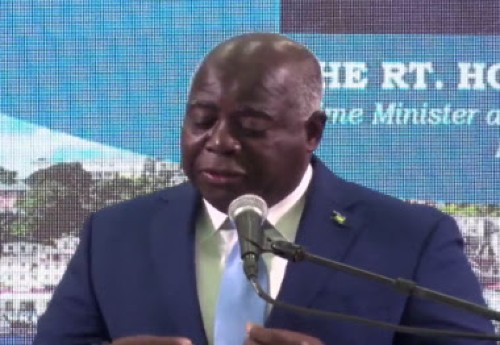Bahamas PM Urges CARICOM to Keep Their Eyes on the Existing 'Bullseye' With Regard to Climate Change
ST. GEORGE’S, Grenada – Bahamas Prime Minister Phillip Davis Thursday warned Caribbean Community (CARICOM) countries against “shooting arrows at new targets” as regional countries meet here to consolidate their position ahead of the United Nations Climate Change Conference (COP 28) that gets underway in Dubai in November.
 Bahamas Prime Minister Phillip Davis addressing the second Caribbean Small Island Developing States (SIDS) High-Level Dialogue on Climate Change being held in Grenada (CMC Photo)Addressing the second Caribbean Small Island Developing States (SIDS) High-Level Dialogue on Climate Change, Davis said the urgency of the work before the region, could not be clearer and that even in the best case scenarios in reducing fossil fuels “for the foreseeable future, our region will continue to experience warming oceans, rising waters and more intense hurricanes”.
Bahamas Prime Minister Phillip Davis addressing the second Caribbean Small Island Developing States (SIDS) High-Level Dialogue on Climate Change being held in Grenada (CMC Photo)Addressing the second Caribbean Small Island Developing States (SIDS) High-Level Dialogue on Climate Change, Davis said the urgency of the work before the region, could not be clearer and that even in the best case scenarios in reducing fossil fuels “for the foreseeable future, our region will continue to experience warming oceans, rising waters and more intense hurricanes”.
He told the audience that included his colleagues from St. Kitts-Nevis, St. Lucia and the host country Grenada, that since the start of the industrial revolution more than a trillion tons of carbon dioxide have been released into the atmosphere.
“Try as they might to skirt around the issue , the industrialized north will need to make the most sizeable adjustments. It is after all their development which has brought us to this point. We must call on our partners in the north to deliver on the commitment they made at COP 15…to mobilize US$100 million per year by 2021.
“This is the very same goal which was reiterated at COP 21 in Paris and extended to 2025. To date they have not reached this target,” Davis said, adding “my friends it makes no sense shooting arrows at new targets when the bullseye of two decades before has yet to be hit.”
Prime Minister Davis said that with COP 28 schedule for November 30 to December 12, it is crucial that developing countries on the front line of the climate crisis hold the developed world to account.
He said whether these countries honor their commitments “could make a difference between a mere disturbance and another devastating category 5 hurricane that hit his country a few years ago causing billions of dollars in damage and is still recovering from.
He said to further the interest of the Caribbean, which are much the same as other Small island Developing States (SIDS) in the Pacific and the Indian oceans “we must as one region be united by clear ideas . and a common purpose.
“We all lie in the same hurricane alley, we all rely to a certain extent on the tourist economy and we all share common…culture that is under threat,” Davis said, urging the delegates to use the occasion “to marry our voices to make ourselves heard.”
Davis said he had advocated the need for a regular CARICOM High level SIS meeting on the United Nations calendar, the first having taken place in Nassau, “because I strongly believe that the Caribbean can accomplish anything it sets its mind to.
“Let us use this forum to identify our priorities, focus our efforts and fight for a sustainable future . A future in which the months of June to November do not spell gloom and doom for the countries of the Caribbean.”
He said that the key to the future for the Caribbean will be the region’s sustained efforts to see a loss and damage fund come to full fruition, noting that the adoption of the fund at COP 27 “was a remarkable achievement of Caribbean solidarity on which we cannot allow to let fall by the wayside.
“The time has come to double down o our efforts to tell these developed nations to write the cheque as they have kicked the can down the road for far too long. WE cannot leave COP 28 without the first pledge of funding being identified,” Davis told the audience.
“This is no minor undertaking, but if they are the big tree, we are the small axe and just as we hold the developed world to account, so too we must take active strides to enhance our own climate resilience,” Davis added.
The meeting here will focus on six thematic areas including financing the transition to renewable energy in the Caribbean, tapping into the potential of wind, solar, geothermal and hydroelectricity as well as transforming international financial architecture, enabling access to blue and green finance, and regional collaboration on carbon pricing mechanisms.
Accelerating e-mobility: lowering costs, reducing emissions, and building a reliable transportation system through electrification is also among the themes to be discussed here.


